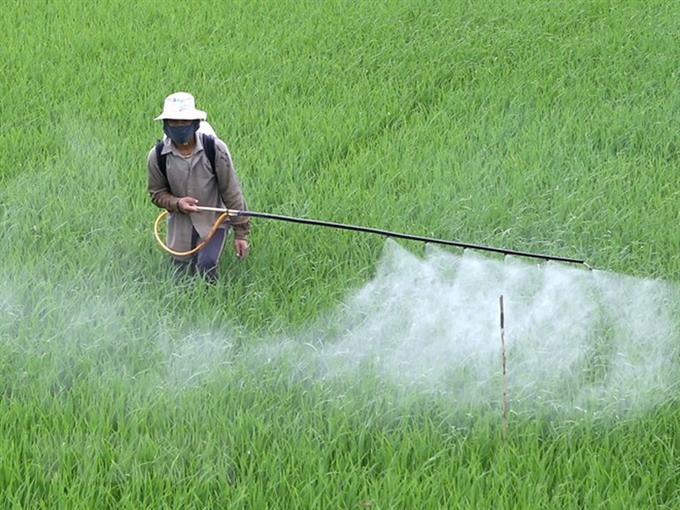 Society
Society

The Plant Protection Department plans to soon submit to the Ministry of Agriculture and Rural Development to remove another three toxic active ingredients of Fipronil, Chlorpyrifos and Glyphosate used in current weed killers.
 |
| A farmer sprays weed killer in a field.— VNA/VNS Photo |
HÀ NỘI — The Plant Protection Department plans to petition the Ministry of Agriculture and Rural Development to ban the toxic ingredients Fipronil, Chlorpyrifos and Glyphosate from weed killer.
Hoàng Trung, head of the department, recently told local media in a press conference that Glyphosate was especially dangerous and could cause humans cancer.
Trung said 36 countries as well as the European Union had made moves to ban the use of Glyphosate in weed killers, he said.
The department also identified that banning the use of the toxic active ingredients aimed to protect human health and the environment, he said.
Therefore, although the suggestion to ban the use of Glyphosate had sparked diverse public comments, the department still wanted the ministry to ban it, he said.
There were up to 77 permitted active ingredients used in weed killers in the country now, leaving a lot of options besides Glyphosate, he said.
“And the market will not suffer any impact,” he said.
Previously, the ministry had given the green light to remove four toxic active ingredients used in weed killers, namely Acephate, Diazinon, Malathion and Zinc phosphide on August 28.
The decision will be valid after 60 days, ending imports of the ingredients.
To minimise losses for businesses, they have one year to use the ingredients.
Statistics from the ministry showed the four active ingredients were used in many weed killers in Việt Nam.
Each of the four active ingredients had been used about 3,000-5,000 tonnes in Việt Nam per year, the ministry said.
For the three active ingredients the department planned to submit the ministry to ban, about 30,000 tonnes of Glyphosate and 3,500 -4,000 tonnes of Fipronil and Chlorpyrifos each are currently used each year in the country.
Future targets
The department hoped to get rid of all toxic active ingredients soon, he added.
Trung also added that the ministry targeted to ban 30 per cent of weed killers currently used in Việt Nam by 2020.
Only weed killers found to be effective and safe for both humans and the environment would be kept, he said.
Following a project to manage weed killers, about 30 per cent of biological weed killers are expected to be used by 2020.
In recent years, many farmers also shifted to using biological weed killers instead of chemical weed killers, he said.
In the coming time, the ministry will issue policies to encourage farmers to use more biological weed killers, he said.
Data from the ministry said Việt Nam spends about US$2.5 million to import weed killers and materials to manufacture weed killers each year. —VNS




